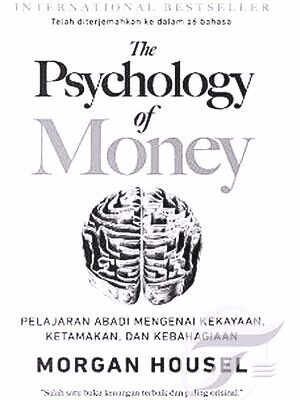Introduction:
In the book “The Psychology of Money,” the author delves into the intriguing connection between psychology and financial decision-making. This unique and human-written book presents valuable insights into the complex dynamics of money and how our mindset and behavior shape our financial outcomes. By exploring various psychological principles and real-life anecdotes, the author provides readers with a deeper understanding of money’s role in our lives. Let’s dive into the key themes discussed in this enlightening book.
Understanding the Relationship between Psychology and Money:
The first chapter of “The Psychology of Money” sets the stage by exploring the fundamental relationship between psychology and money. It highlights that money is not solely a rational or mathematical concept but is deeply influenced by our emotions, biases, and societal norms. Gaining insight into these psychological factors is crucial for enhancing financial decision-making and attaining sustainable long-term financial prosperity.
The Role of Emotions in Financial Decision-Making:
One of the core aspects of this book is the examination of how emotions influence our financial choices. The author emphasizes that our emotional state can significantly impact our investment decisions, often leading to irrational behaviors such as impulsive buying or panic selling. By recognizing and managing our emotions effectively, we can avoid costly mistakes and cultivate a healthier relationship with money.
The Impact of Behavioral Biases on Wealth Creation:
Building upon the previous point, “The Psychology of Money” sheds light on the various behavioral biases that affect our wealth creation journey. From overconfidence and loss aversion to the herd mentality, these biases can lead us astray and hinder our ability to build long-term wealth. By understanding these biases, readers can develop strategies to mitigate their effects and make more objective financial choices.
The Power of Long-Term Thinking and Compound Interest:
This section emphasizes the significance of long-term thinking and the remarkable power of compound interest. By adopting a patient and disciplined approach to investing, individuals can harness the compounding effect to grow their wealth exponentially over time. The book highlights the importance of starting early, being consistent, and staying invested to reap the full benefits of compounding.
The Importance of Risk Management and Diversification:
“The Psychology of Money” delves into the crucial aspects of risk management and diversification in investment portfolios. It’s crucial to establish a risk/reward ratio that works for you despite the fact that this is a personal decision. In doing so, you will make it easier for yourself to accomplish your objectives and follow your values when making financial decisions. Through insightful anecdotes, the book underscores the potential pitfalls of excessive risk-taking and the benefits of diversifying investments.
The Influence of Social Factors on Financial Outcomes:
Our financial decisions are not made in a vacuum but are heavily influenced by social factors. This section explores how societal norms, peer pressure, and cultural expectations impact our relationship with money. When readers grasp these influences, they can make informed decisions and harmonize their financial goals with their values, rather than being swayed by external pressures.
Balancing the Present and Future: Money and Happiness:
“The Psychology of Money” offers a thought-provoking exploration of the delicate balance between money and happiness. This challenges the belief that increased wealth directly translates to greater happiness, urging readers to prioritize aligning their financial decisions with their overall well-being. By finding the right balance between present enjoyment and future security, individuals can create a fulfilling and meaningful relationship with money.
Investing in Yourself: The Ultimate Financial Asset
The final chapter highlights the importance of investing in oneself as the ultimate financial asset. The book advocates for continuous learning, personal development, and building valuable skills that can enhance our earning potential and overall financial success. By making an investment in ourselves, we strengthen our capacity for adaptation and provide ourselves the tools we need to successfully negotiate the always-evolving financial landscape, ultimately paving the way for long-term success.
Conclusion:
In conclusion, “The Psychology of Money” offers a captivating exploration of the intricate relationship between psychology and our financial decisions. Crafted by humans and distinct, this book blends psychological insights, real-life narratives, and practical guidance to offer readers a comprehensive grasp of how money profoundly influences our lives. By unraveling the mysteries of our financial behavior, readers can gain valuable insights to make wiser financial choices and cultivate a healthier mindset towards money.
( Understanding the Illusion of Saving Money: The Puzzle of Rational Thinking Break free).
FAQs:
Q1. Is “The Psychology of Money” suitable for individuals with no background in finance?
Absolutely! Written in a style that caters to readers, the book ensures accessibility for anyone seeking to comprehend the psychological dimensions of money. It doesn’t require prior knowledge of finance or economics.
Q2. Does the book offer practical tips on managing personal finances?
Yes, “The Psychology of Money” includes practical advice and strategies for managing personal finances effectively. It offers actionable insights that readers can apply to their financial journeys.
Q3: Does the book include any case studies or real-life illustrations?
Yes, the book incorporates numerous real-life anecdotes and case studies to illustrate key concepts and principles. These stories make the content relatable and engaging.
Q4. Can this book help me change my mindset about money?
Absolutely! “The Psychology of Money” provides readers with a fresh perspective on money and can help reshape their mindset and beliefs surrounding financial matters.


As I website possessor I conceive the subject matter here is rattling wonderful, thanks for your efforts.